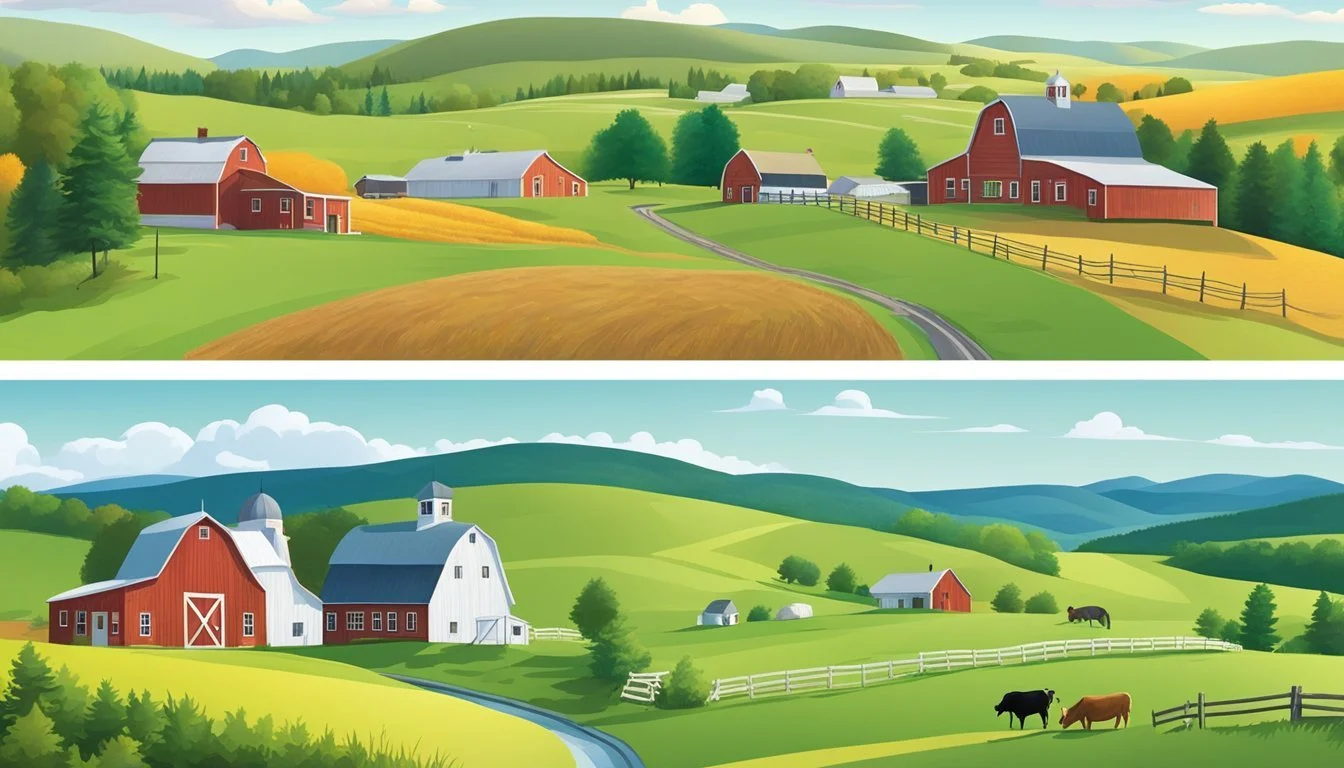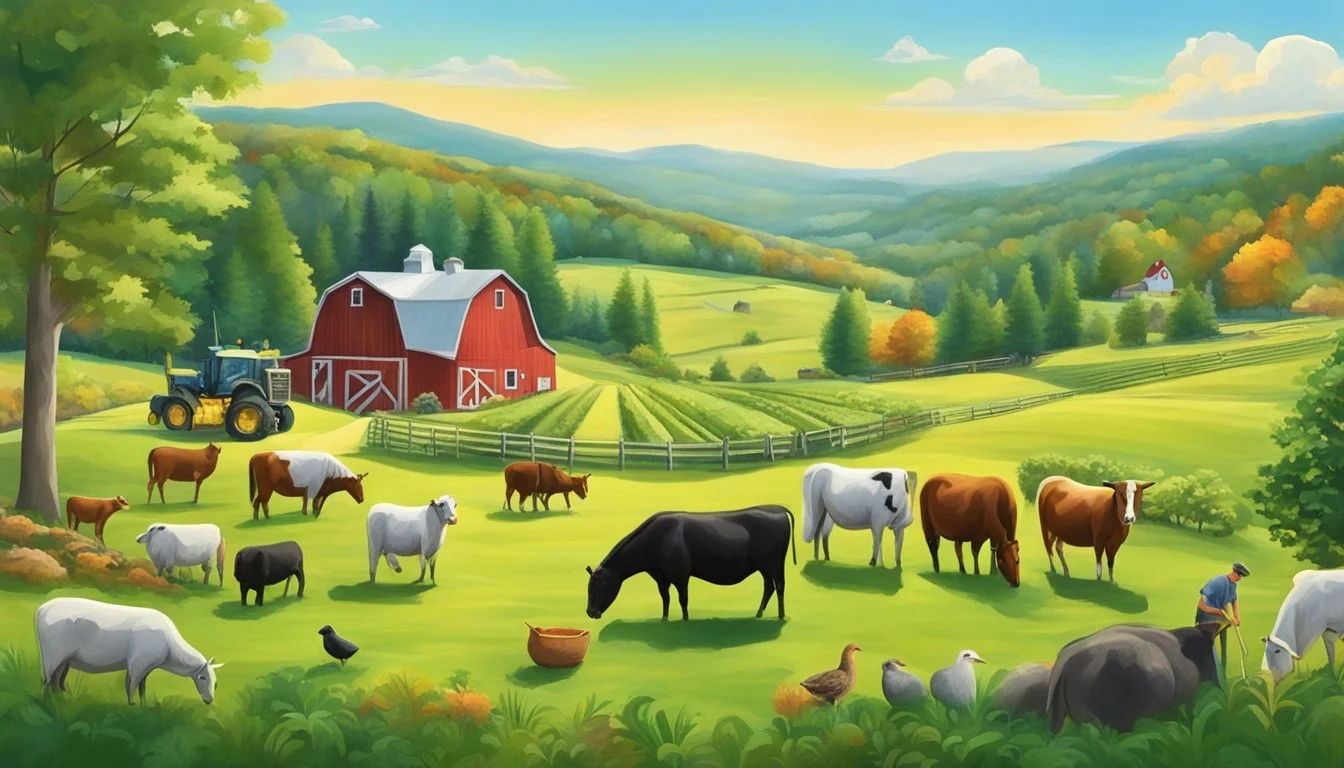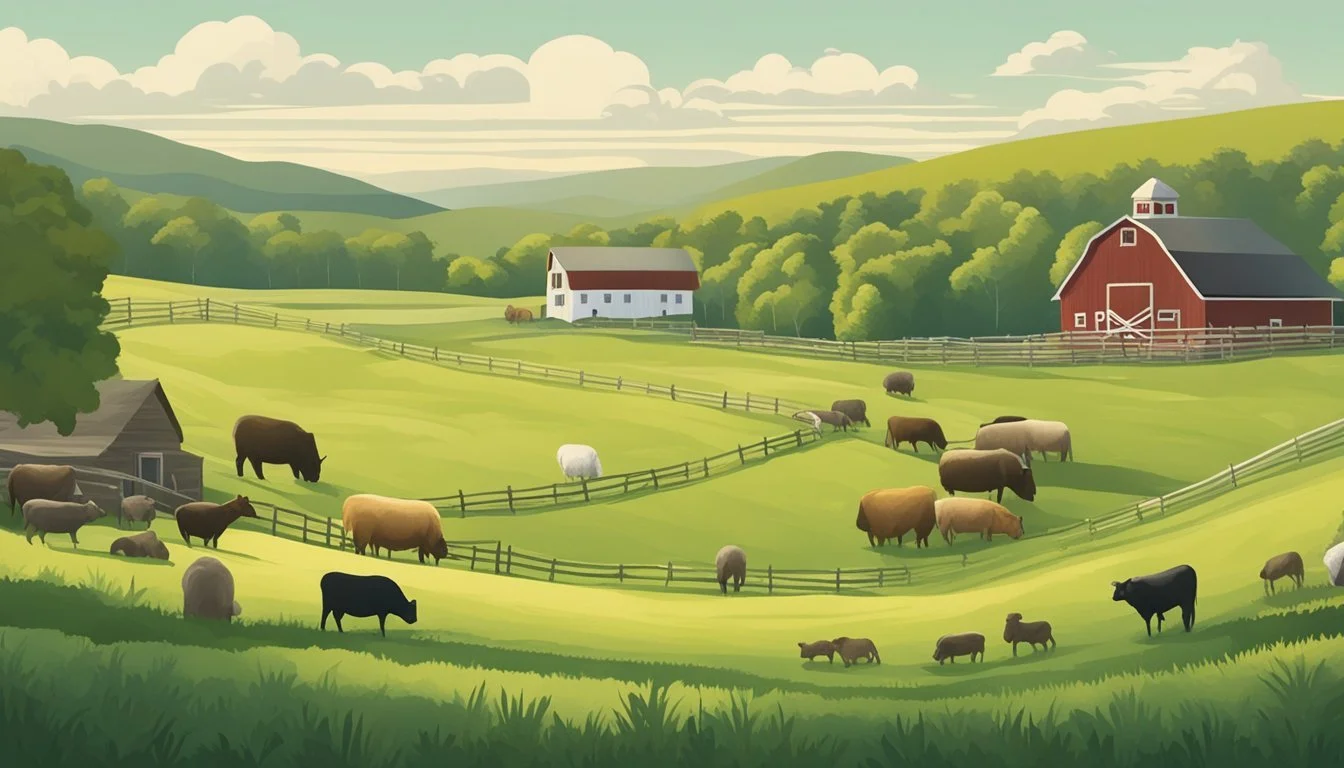Agritourism in New Hampshire
Exploring Farm-Based Getaways
New Hampshire, characterized by its verdant forests, historic colonial homes, and scenic coastlines, offers a unique blend of natural beauty and agricultural heritage. This combination lays the groundwork for the state's varied agritourism opportunities which attract visitors year-round. With its rich soil, the state boasts a diverse array of crops such as hay, maple syrup, apples, and sweet corn, each playing a role in the agritourism sector. Visitors to New Hampshire are invited to connect with the land and local farmers through an assortment of activities ranging from pick-your-own orchards to farm stays.
The state's agritourism spots not only provide recreational activities but also help educate the public on agricultural practices and the importance of sustainable farming. Numerous farms offer guided tours, hands-on experiences, and direct sales of produce through farm stands and markets, reinforcing the farm-to-table movement. During the various seasons, New Hampshire's agritourism sites adapt to offer seasonal activities like corn mazes and hayrides in the fall, lush flower fields in the spring and summer, and Christmas tree cutting in the winter months.
With agritourism being a burgeoning aspect of New Hampshire's economy, the state actively supports this sector through initiatives and resources that aid farmers in diversifying their income through tourism. These efforts not only bolster the rural economy but also provide a platform for preserving the state's agricultural legacy. Through the lens of agritourism, visitors and residents alike gain a deeper appreciation for New Hampshire's agricultural roots and the growing allure of its rural landscapes.
Understanding Agritourism
Agritourism encapsulates activities that merge agriculture with tourism, providing a bridge between producers and consumers. This section details its definition and the specific expansion it has seen within the state of New Hampshire.
Definition and Concept
Agritourism is a niche form of commercial enterprise that attracts visitors to an agricultural setting or activity, often for educational and recreational purposes. In essence, it connects the agrarian world with those desiring an immersive rural experience. Integral to agritourism are activities such as:
Farm stays
Pick-your-own crops
Farm tours
Corn mazes
On-farm festivals
Such activities enable visitors to engage directly with farming operations, gaining insight into the production of food and other agricultural products.
Growth of Agritourism in New Hampshire
New Hampshire's agritourism sector has witnessed significant growth, attributing to both economic need and consumer interest in sustainable practices. The state's vast pastoral lands and scenic beauty have created the perfect backdrop for agritourism ventures. Farms have expanded their offerings to include:
Farm-based lodging: Encouraging longer stays and deeper engagement with agricultural life.
Maple syrup and apple picking: Capitalizing on New Hampshire's top crops, farms offer interactive experiences.
Seasonal events: Such as rural weddings and harvest festivals, drawing visitors year-round.
This expansion reflects the increasing demand for experiences that blend recreational and educational elements with the charm of New Hampshire's countryside.
Major Agritourism Activities in New Hampshire
New Hampshire's landscape provides an ideal setting for a variety of agritourism activities, ranging from hands-on educational experiences to leisurely farm tours and seasonal harvesting events.
Farm Tours and Educational Programs
New Hampshire's farms offer a wealth of educational programs aimed at providing visitors a closer look at agricultural operations. Tours often lead guests through the daily routines of farming, showcasing practices such as sustainable agriculture and animal husbandry. Aside from the charm of bucolic settings, these tours provide substantial learning opportunities that emphasize the importance of local farming to communities.
Pick Your Own Crops
Pick-your-own farms in New Hampshire are a beacon for those seeking the freshest local produce directly from the source. Visitors can often be found in the fields during the warmer months, harvesting their own selections of berries and apples. This hands-on activity not only supports local farmers but also offers an enjoyable way to engage with the state's agricultural bounty.
Popular crops include:
Apples: Fuji, Honeycrisp, McIntosh
Berries: Blueberries, Strawberries, Raspberries
Agritourism Events
Throughout the year, New Hampshire celebrates agriculture with a variety of events, attracting locals and tourists alike. The harvest festivals embody the spirit of the region, featuring local produce, live music, and crafts. A quintessential agritourism attraction is the corn maze, a favorite fall pastime that combines entertainment with an appreciation for crop cultivation. These events serve not only as entertainment but also as an important platform for farmers to connect with the community.
Notable events include:
Farm Event Type Notable Features Hemingway Farms Harvest Festival Community-oriented activities, fresh produce Local Orchard Corn Maze A fun, themed maze through the fields
The Economic Impact of Agritourism
Agritourism has become a significant contributor to New Hampshire's economy, attracting leisure travelers and generating a ripple effect that extends beyond direct farm sales.
Boosting Local Economy
In New Hampshire, agritourism is more than a leisure activity; it is an economic driver. The fall foliage and the picturesque farms of the Granite State draw in tourists looking for an authentic rural experience. This influx of visitors supports local businesses including restaurants, hotels, and shops, as they spend on more than just agricultural activities. These expenditures circulate through the local economy, multiplying their impact and promoting overall economic growth in the state.
Direct impact: Tourist expenditures on farm experiences such as apple picking or hayrides.
Indirect impact: Spending on hotels, dining, and other local services.
Generating Direct Sales
For New Hampshire farms, agritourism offers a platform to increase revenue through direct sales. From pick-your-own orchards to farm stands, agritourism encourages consumers to buy local produce, thereby putting money directly back into the pockets of farmers. By diversifying their income through agritourism activities, farm owners mitigate the financial risks associated with traditional farming operations.
Farm experiences: Corn mazes, farm stays, and educational tours.
Local produce sales: Increase in sales due to heightened visitor interest in local goods.
By embracing agritourism, New Hampshire not only preserves its agricultural heritage but also fosters a robust economy that benefits farmers and the community alike.
Best Practices for Agritourism Operators
The success of an agritourism operation hinges on effective property management, exceptional customer experiences, and adhering to safety and regulatory requirements. Operators should consider property logistics, engage visitors with the farm's charm, and ensure safety is paramount.
Property Management
Agritourism operators should employ systematic property management to ensure efficient operations. This includes:
Parking: Adequate parking must be provided to accommodate peak traffic, with clear signage and ease of access.
Traffic Flow: On-site traffic should be directed such that it does not interfere with the workings of the farm, and local traffic ordinances should be observed.
Land Use: Special exceptions might be necessary if the property's zoning does not automatically permit agritourism. Operators should familiarize themselves with local land use regulations.
Customer Experience
Operators can boost customer experience by highlighting the unique features of their family-owned and working farm:
Engagement: Interactive activities such as pick-your-own fruit or guided farm tours can enhance visitor involvement.
Amenities: Basic amenities, such as clean restrooms and shaded picnic areas, should be available to make the stay more comfortable.
Safety and Regulations
Compliance with safety and regulatory requirements is critical for agritourism operators to protect themselves and their guests:
Safety Training: Operators should undergo safety training certification programs to handle on-farm risks effectively.
Regulations: Awareness and implementation of state licensing requirements, animal venue best practices, and facility design should be maintained to meet regulatory standards.
Types of Agritourism Properties
Agritourism in New Hampshire encompasses a variety of properties, each offering unique experiences that allow visitors to immerse themselves in the local agricultural lifestyle.
Working Farms and Gardens
Visitors to New Hampshire's working farms and gardens have the opportunity to experience hands-on activities in a real-world agricultural setting. They can engage in daily farm operations ranging from picking apples in orchards to participating in seasonal events like harvest festivals. Livestock farms provide interactive experiences with animals, and many working farms combine crop production with animal husbandry, offering a comprehensive look at farm life.
Farm Stands and Markets
Farm stands and markets are a staple of the New Hampshire agritourism scene. These venues often sell fresh, locally grown produce, including fruits, vegetables, and even Christmas trees during the holiday season. They provide a critical connection between farmers and consumers, showcasing the diversity and freshness of New Hampshire's agricultural products.
Specialized Agritourism Farms
Some farms in New Hampshire focus on specialized agritourism experiences that cater to specific interests. For example, vineyards offer wine tastings and tours, explaining the winemaking process from grape to bottle. Petting farms allow visitors, especially children, to interact closely with animals, while farms with corn mazes or haunted forests offer seasonal entertainment. Maple farms highlight the process of making maple syrup, an iconic product of the region.
Key Challenges and Solutions in Agritourism
Agritourism in New Hampshire presents unique challenges and solutions, especially concerning land use and operational balance. This section examines the pivotal issues and the innovative strategies employed to address them.
Zoning and Land Use Issues
Zoning ordinances can present significant hurdles for farm owners in New Hampshire looking to diversify into agritourism. They may face restrictive policies which limit the use of agricultural lands for agritourism activities. Solutions such as lobbying for ordinance adjustments and seeking special permits have seen success. For instance, by working with local government, farm operators can modify regulations to better accommodate agritourism-related traffic and implement strategies to minimize impact on neighborhoods.
Traffic: Creation of traffic plans and off-site parking provisions.
Ordinance Adjustments: Negotiation with local authorities to amend zoning laws.
Balancing Public Access with Farm Operations
The integration of the public into private farming operations can cause disruptions. Farms must balance the need to maintain a profitable agricultural practice with the influx of visitors. Solutions include implementing visitor schedules around peak farm activity times and crafting clear visitor policies to ensure operations remain uninterrupted and safe.
Visitor Schedules: Aligning visitor hours with farming operations.
Clear Visitor Policies: Establishing rules for public engagement to protect farm integrity and neighborhood relations.
Agritourism Resources and Support
In New Hampshire, individuals looking to venture into agritourism have access to a wealth of resources and support mechanisms. These resources are designed to guide, educate, and provide practical support for the establishment and marketing of agritourism enterprises.
Guide to Starting an Agritourism Business
Those who are interested in starting an agritourism business in New Hampshire can find comprehensive guidance through available fact sheets. They offer critical insights on various farm-based visitor activities such as pick-your-own orchards and farm stays. These guides aid new entrants in understanding how agritourism can contribute to a farm's revenue and how to navigate the local regulatory environment.
Key considerations may include:
Zoning regulations
Liability insurance
Health and safety standards
Education and Training Programs
Education and training programs play a pivotal role in equipping farm owners and operators with the necessary skills to manage and grow their agritourism ventures. Programs may cover topics from customer service to financial management, specifically tailored for agricultural contexts.
Programs offered may include:
Workshops: Hands-on activities involving farm management and guest experiences.
Seminars: Focused on best practices in agritourism and latest trends.
Marketing and Promotion
Marketing and promotional support is crucial for connecting agritourism businesses with potential consumers. New Hampshire provides resources on how best to market agritourism activities, including farmers' markets and seasonal festivals.
Tools for promotion might include:
Online directories listing agritourism operations
Social media marketing strategies for direct consumer engagement
Participation in state-sponsored tourism campaigns
Exploring Agritourism Destinations
Agritourism in New Hampshire invites visitors to immerse themselves in diverse farm-centric experiences, from the joy of picking your own fruits to the exploration of regional agricultural fairs.
Regional Highlights
New Hampshire is celebrated for its rich agricultural offerings, with crops, flowers, and maple syrup ranking among the state's cherished produce. Travellers can explore over 15 vineyards and delight in the local production of milk from dairy farms.
Berry and Apple Picking: Many farms throughout the region offer 'pick your own' opportunities, especially for berries and apples. This interactive experience is a favorite during the harvest seasons.
Corn Mazes: For those seeking adventure, navigating the twists and turns of a corn maze is a fall tradition that combines fun with education about corn crops.
Agricultural Fairs: Seasonal fairs offer visitors a taste of local tradition, showcasing livestock, produce, and crafts, often with a backdrop of live music and entertainment.
Flower Farms: Visitors can wander through fields of blooms or participate in flower-picking activities at local flower farms.
Concord, the state's capital, serves as a central hub for agritourism activities and provides access to numerous farms and agricultural centers in the surrounding area.
Interactive Maps and Tours
Guides and Maps: A comprehensive map is essential for visitors to navigate New Hampshire’s agritourism sites efficiently. Various farms and tourism boards provide interactive maps and guides that pinpoint locations for 'pick your own' farms, corn mazes, and local fairs.
Interactive Experiences: Some farms offer virtual tours or interactive maps on their websites, enhancing visitors' planning experience. These resources are particularly helpful for educational groups eager to learn about farming practices.
Guided Tours: For a more structured visit, some destinations provide guided tours, giving insights into the daily operations of milking cows, caring for chickens, and tapping for maple syrup.
Using interactive tools, tourists can confidently plan their agritourism adventures, ensuring they experience the bounty and beauty of New Hampshire's farms.
Sustainable Practices in Agritourism
In New Hampshire, agritourism is intertwining sustainability with agricultural prosperity. Farms are integrating sustainable practices, such as organic agriculture and conservation efforts, to ensure the future health of the land and the local economy.
Organic Agriculture
Organic agriculture is a cornerstone of sustainable agritourism in New Hampshire. This approach eschews synthetic fertilizers and pesticides, fostering a healthier ecosystem. Organic sales reflect the growing demand for products that are not just consumable, but are also produced responsibly. Several farms have embraced organic practices, contributing to a marked increase in organic commodities. For instance, the use of natural composting methods and organic cattle management are pivotal, as they reduce the ecological footprint and provide visitors with insight into environmentally-friendly farming techniques.
Conservation and Preservation
Farms in New Hampshire are actively engaged in conservation and preservation efforts, recognizing the importance of maintaining the natural landscape for future generations. Agricultural conservation employs numerous strategies such as:
Crop rotation and cover cropping to maintain soil health.
Preserving water quality through riparian buffers.
Integrating wildlife habitats into agricultural settings.
These efforts help maintain biodiversity, protect water sources, and reduce soil erosion. By preserving the natural state of their farms, New Hampshire agritourism operators create not only sustainable business models but also educational platforms for visitors to learn about and participate in conservation practices.
Conclusion
The rise of agritourism in New Hampshire represents a significant turn towards more diversified farm revenue streams. Farmers in the state have embraced the blending of agriculture and tourism, recognizing the potential for an improved bottom line. The consistent growth in income from activities like farm tours, corn mazes, and pick-your-own fruit ventures reflects this trend.
One of the primary benefits of agritourism is its versatility; it can be adapted to a farm's existing operations with minimal disruption to crucial farming tasks, such as milking times. Farm-based lodging, petting farms, and on-farm seasonal festivals also enhance the agricultural experience for visitors, while providing farms with additional sources of income.
For farmers looking to tap into agritourism, planning is essential. They must consider operational aspects like visitor safety, traffic flow, and insurance needs. When these factors are well managed, agritourism not only draws a new audience to a farm but also promotes local culture and sustains the agricultural community.
Economic Impact: Diversification through agritourism has boosted incomes for participating farms.
Operational Synergy: Integration with existing farm activities, ensuring tasks like milking are not compromised.
Strategic Planning: Essential for addressing aspects such as insurance, safety, and traffic, contributing to a seamless conversion to an agritourism model.
In summary, agritourism presents an evolving opportunity for New Hampshire farms, affecting agricultural practices positively by expanding market reach and financial stability.











